Mathieu Morlon
SmolVLM: Redefining small and efficient multimodal models
Apr 07, 2025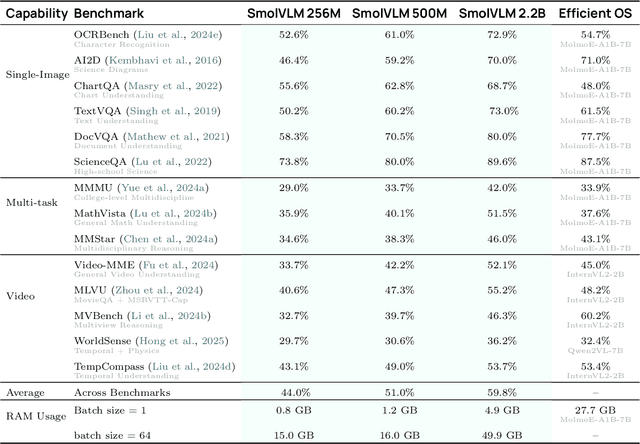
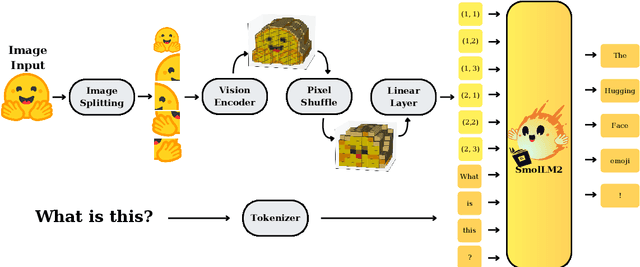


Abstract:Large Vision-Language Models (VLMs) deliver exceptional performance but require significant computational resources, limiting their deployment on mobile and edge devices. Smaller VLMs typically mirror design choices of larger models, such as extensive image tokenization, leading to inefficient GPU memory usage and constrained practicality for on-device applications. We introduce SmolVLM, a series of compact multimodal models specifically engineered for resource-efficient inference. We systematically explore architectural configurations, tokenization strategies, and data curation optimized for low computational overhead. Through this, we identify key design choices that yield substantial performance gains on image and video tasks with minimal memory footprints. Our smallest model, SmolVLM-256M, uses less than 1GB GPU memory during inference and outperforms the 300-times larger Idefics-80B model, despite an 18-month development gap. Our largest model, at 2.2B parameters, rivals state-of-the-art VLMs consuming twice the GPU memory. SmolVLM models extend beyond static images, demonstrating robust video comprehension capabilities. Our results emphasize that strategic architectural optimizations, aggressive yet efficient tokenization, and carefully curated training data significantly enhance multimodal performance, facilitating practical, energy-efficient deployments at significantly smaller scales.
SmolLM2: When Smol Goes Big -- Data-Centric Training of a Small Language Model
Feb 04, 2025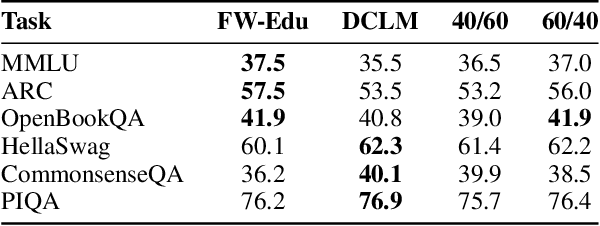
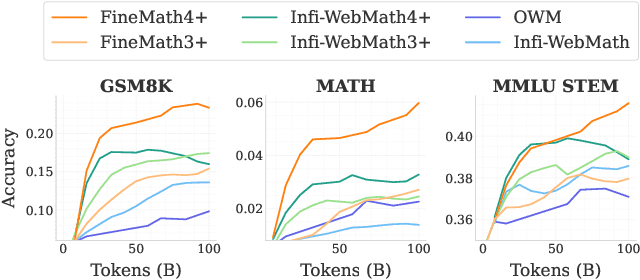

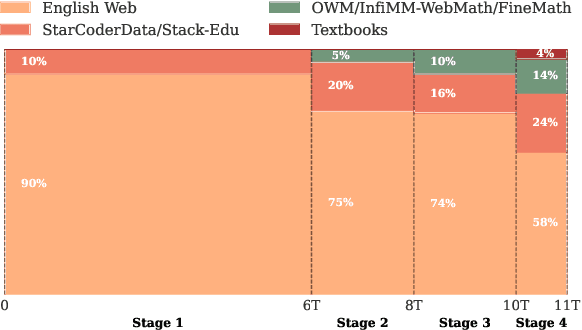
Abstract:While large language models have facilitated breakthroughs in many applications of artificial intelligence, their inherent largeness makes them computationally expensive and challenging to deploy in resource-constrained settings. In this paper, we document the development of SmolLM2, a state-of-the-art "small" (1.7 billion parameter) language model (LM). To attain strong performance, we overtrain SmolLM2 on ~11 trillion tokens of data using a multi-stage training process that mixes web text with specialized math, code, and instruction-following data. We additionally introduce new specialized datasets (FineMath, Stack-Edu, and SmolTalk) at stages where we found existing datasets to be problematically small or low-quality. To inform our design decisions, we perform both small-scale ablations as well as a manual refinement process that updates the dataset mixing rates at each stage based on the performance at the previous stage. Ultimately, we demonstrate that SmolLM2 outperforms other recent small LMs including Qwen2.5-1.5B and Llama3.2-1B. To facilitate future research on LM development as well as applications of small LMs, we release both SmolLM2 as well as all of the datasets we prepared in the course of this project.
Let's Get It Started: Fostering the Discoverability of New Releases on Deezer
Jan 05, 2024


Abstract:This paper presents our recent initiatives to foster the discoverability of new releases on the music streaming service Deezer. After introducing our search and recommendation features dedicated to new releases, we outline our shift from editorial to personalized release suggestions using cold start embeddings and contextual bandits. Backed by online experiments, we discuss the advantages of this shift in terms of recommendation quality and exposure of new releases on the service.
Track Mix Generation on Music Streaming Services using Transformers
Jul 06, 2023


Abstract:This paper introduces Track Mix, a personalized playlist generation system released in 2022 on the music streaming service Deezer. Track Mix automatically generates "mix" playlists inspired by initial music tracks, allowing users to discover music similar to their favorite content. To generate these mixes, we consider a Transformer model trained on millions of track sequences from user playlists. In light of the growing popularity of Transformers in recent years, we analyze the advantages, drawbacks, and technical challenges of using such a model for mix generation on the service, compared to a more traditional collaborative filtering approach. Since its release, Track Mix has been generating playlists for millions of users daily, enhancing their music discovery experience on Deezer.
Flow Moods: Recommending Music by Moods on Deezer
Jul 15, 2022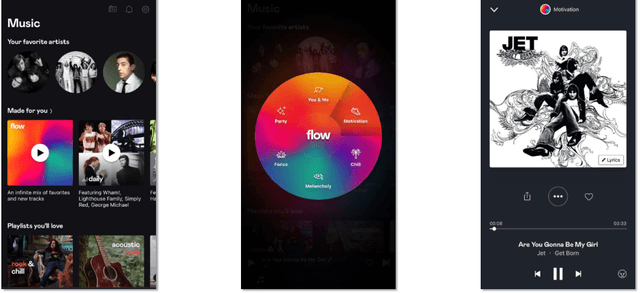
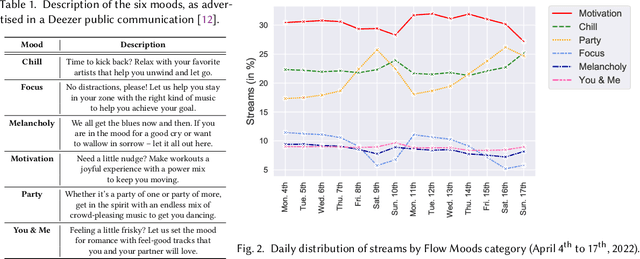
Abstract:The music streaming service Deezer extensively relies on its Flow algorithm, which generates personalized radio-style playlists of songs, to help users discover musical content. Nonetheless, despite promising results over the past years, Flow used to ignore the moods of users when providing recommendations. In this paper, we present Flow Moods, an improved version of Flow that addresses this limitation. Flow Moods leverages collaborative filtering, audio content analysis, and mood annotations from professional music curators to generate personalized mood-specific playlists at scale. We detail the motivations, the development, and the deployment of this system on Deezer. Since its release in 2021, Flow Moods has been recommending music by moods to millions of users every day.
A Semi-Personalized System for User Cold Start Recommendation on Music Streaming Apps
Jun 07, 2021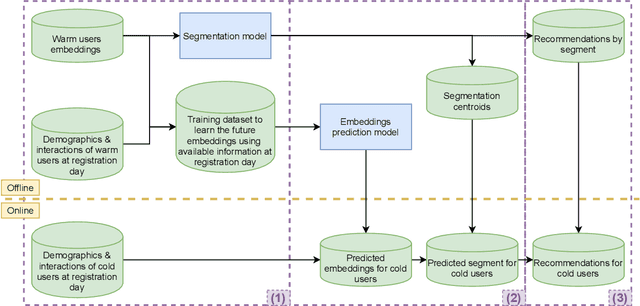

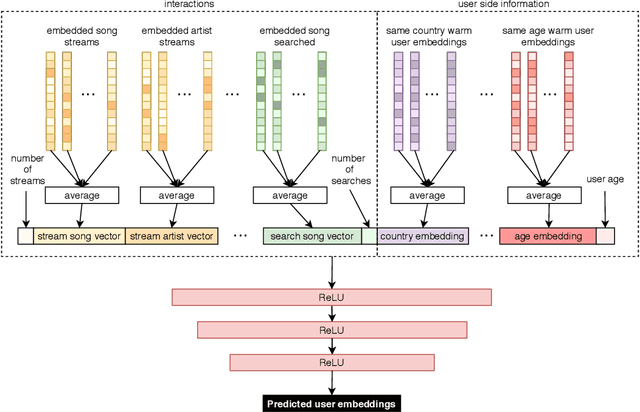
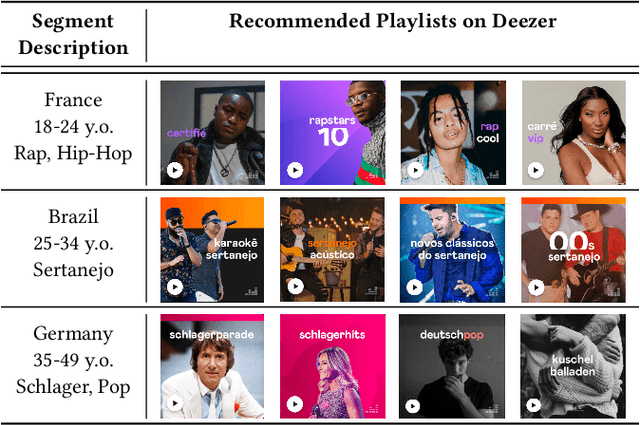
Abstract:Music streaming services heavily rely on recommender systems to improve their users' experience, by helping them navigate through a large musical catalog and discover new songs, albums or artists. However, recommending relevant and personalized content to new users, with few to no interactions with the catalog, is challenging. This is commonly referred to as the user cold start problem. In this applied paper, we present the system recently deployed on the music streaming service Deezer to address this problem. The solution leverages a semi-personalized recommendation strategy, based on a deep neural network architecture and on a clustering of users from heterogeneous sources of information. We extensively show the practical impact of this system and its effectiveness at predicting the future musical preferences of cold start users on Deezer, through both offline and online large-scale experiments. Besides, we publicly release our code as well as anonymized usage data from our experiments. We hope that this release of industrial resources will benefit future research on user cold start recommendation.
 Add to Chrome
Add to Chrome Add to Firefox
Add to Firefox Add to Edge
Add to Edge